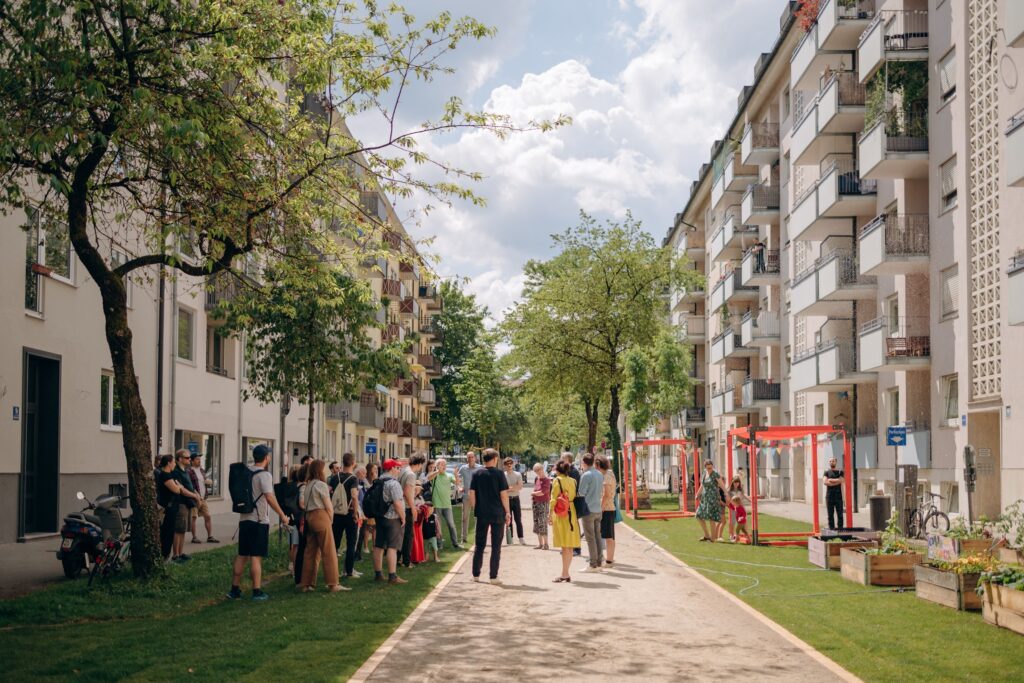We researched urban mobility in neighborhoods against the backdrop of the growing challenges facing cities, such as continuous population growth and the climate crisis. To this end, street spaces in two Munich neighborhoods were temporarily redesigned for more sustainable mobility, encounters and greenery. Together with local residents, we tested what future neighborhoods in Munich could look like. The real-world laboratory was empirically supplemented by simulations and modeling as well as the co-creative development of future scenarios.
For us, the focus was on thinking about solutions together with citizens, testing them, discussing them and thus learning about change processes. We used various methods for this: surveys, dialog formats and workshops with residents, simulations to analyze traffic performance and traffic patterns, modeling of a mobility hub network. We developed transformative teaching formats and future scenarios in cooperation with the TrEx project and together with citizens.
The temporary implementation of solutions in the two Munich project areas "Südliche Au" and "Walchenseeplatz", the so-called real laboratories, were central to this. In the summer of 2023, new spaces were created for a limited period of time in both districts on public traffic areas, inviting people to linger, garden or play, for example. These redesigns were complemented by mobility points where alternatives to the private car were offered.
Munich is growing, there are more hot days in summer and extreme weather events are on the rise, and changes in mobility behavior require a redistribution of public space. There is no single solution to meet these challenges. We can only find out together how we can transform cities into climate-friendly and socially just cities. To do this, new approaches must be tested - in other words, new forms of cooperation between science, administration, business and society.
From the parking license areas within the central ring road, we selected two project areas that are typical for Munich - the Südliche Au with Kolumbusstraße and smaller neighbourhood squares and Landlstraße in Obergiesing at Walchenseeplatz. The mesoscopic modeling referred to Munich's urban space, the microscopic simulations to the two project areas.
For questions and comments please contact us via Mail.

Last weekend, on June 17, 2023, we launched our aqt project - car-reduced districts for a liveable city in the southern Au and Giesing districts. Together with around 800 residents and passers-by, we celebrated the launch all Saturday long and were accompanied by local musicians and artists.
A motivated consortium of experienced partners from science, business, the public sector and society is working together in an interdisciplinary and transdisciplinary manner on the pressing issues of our time.
No results available
What if fewer cars were normal in the city?
Fewer cars, more life - is that possible? The aqt project has transformed Munich's streets into vibrant living spaces in 2023. The majority of residents say: yes, it works!
With this in mind, we invited our 14 projects to report on their goals, challenges and successes in a series of interviews.
As part of the MCube Speaker Series "Future of Mobility", researchers and industry leaders summarized the real-world laboratory in the southern Au.
From July to October 2023, a section of Landlstraße in Obergiesing was closed to vehicle traffic as part of the MCube project aqt. Seating, raised beds and trees invite you to use the space.
On June 17, 2023, our aqt project was launched - on Schlotthauerplatz and Edlingerplatz and in between on Kolumbusstraße, visitors were able to experience a car-reduced and repurposed space.
As the public and experts agree, the reduction of private vehicles in inner-city neighborhoods offers great potential for upgrading and climate adaptation of urban public spaces.
No results available
Are you interested in working with MCube?
Then please get in touch with us.
What is MOSAIQ?
Imagine something: There is more space for people. The streets have more trees and plants. Everyone can get around better. That's how your Schwabing-West district could be in the future. How would you like your district to be? We want to talk to you about it!
The project is called MOSAIQ. MOSAIQ is a research∙project. MOSAIQ means: Mobility and urban climate in the future city∙part. The Technical University of Munich is leading the project.
What is MOSAIQ about?
MOSAIQ wants to make the streets in the city∙part more beautiful. People should feel comfortable there. There should be more space. For meetings and plants, for example. You can help decide what is tried out in the Stadt∙teil. The ideas come from you. Some ideas will be tried out on the streets for a certain period of time.
The aim of MOSAIQ is to make urban districts good places to live.
At the same time, the climate in the city should improve. And people should be able to move around the city easily.
What is happening in the district?